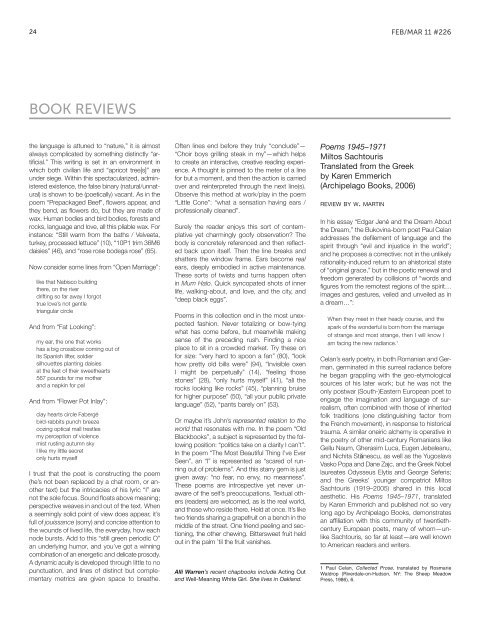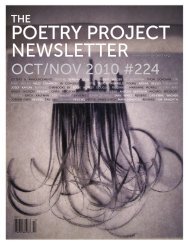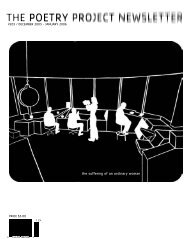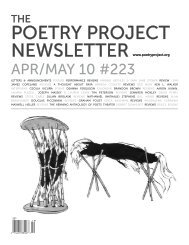Create successful ePaper yourself
Turn your PDF publications into a flip-book with our unique Google optimized e-Paper software.
24 FEB/MAR 11 #226BOOK REVIEWSthe language is attuned to “nature,” it is almostalways complicated by something distinctly “artificial.”This writing is set in an environment inwhich both civilian life and “apricot tree[s]” areunder siege. Within this spectacularized, administeredexistence, the false binary (natural/unnatural)is shown to be (poetically) vacant. As in thepoem “Prepackaged Beef”, flowers appear, andthey bend, as flowers do, but they are made ofwax. Human bodies and bird bodies, forests androcks, language and love, all this pliable wax. Forinstance: “Still warm from the baths / Velveeta,turkey, processed lettuce” (10), “10P1 trim 36M6daisies” (46), and “rose rose bodega rose” (65).Now consider some lines from “Open Marriage”:like that Nabisco buildingthere, on the riverdrifting so far away I forgottrue love’s not gentletriangular circleAnd from “Fat Looking”:my ear, the one that workshas a big crossbow coming out ofits Spanish lifter, soldiersilhouettes planting daisiesat the feet of their sweethearts567 pounds for me motherand a napkin for palAnd from “Flower Pot Inlay”:clay hearts circle Fabergébird-rabbits punch breezeoozing optical mall trestlesmy perception of violencemist rusting autumn skyI like my little secretonly hurts myselfI trust that the poet is constructing the poem(he’s not been replaced by a chat room, or anothertext) but the intricacies of his lyric “I” arenot the sole focus. Sound floats above meaning;perspective weaves in and out of the text. Whena seemingly solid point of view does appear, it’sfull of jouissance (sorry) and concise attention tothe wounds of lived life, the everyday, how eachnode bursts. Add to this “still green periodic O”an underlying humor, and you’ve got a winningcombination of an energetic and delicate prosody.A dynamic acuity is developed through little to nopunctuation, and lines of distinct but complementarymetrics are given space to breathe.Often lines end before they truly “conclude”—“Choir boys grilling steak in my”—which helpsto create an interactive, creative reading experience.A thought is pinned to the meter of a linefor but a moment, and then the action is carriedover and reinterpreted through the next line(s).Observe this method at work/play in the poem“Little Cone”: “what a sensation having ears /professionally cleaned”.Surely the reader enjoys this sort of contemplativeyet charmingly goofy observation? <strong>The</strong>body is concretely referenced and then reflectedback upon itself. <strong>The</strong>n the line breaks andshatters the window frame. Ears become realears, deeply embodied in active maintenance.<strong>The</strong>se sorts of twists and turns happen oftenin Mum Halo. Quick syncopated shots of innerlife, walking-about, and love, and the city, and“deep black eggs”.Poems in this collection end in the most unexpectedfashion. Never totalizing or bow-tyingwhat has come before, but meanwhile makingsense of the preceding rush. Finding a niceplace to sit in a crowded market. Try these onfor size: “very hard to spoon a fan” (80), “lookhow pretty old bills were” (94), “Invisible oxenI might be perpetually” (14), “feeling thosestones” (28), “only hurts myself” (41), “all therocks looking like rocks” (45), “planning bruisefor higher purpose” (50), “all your public privatelanguage” (52), “pants barely on” (53).Or maybe it’s John’s represented relation to theworld that resonates with me. In the poem “OldBlackbooks”, a subject is represented by the followingposition: “politics take on a clarity I can’t”.In the poem “<strong>The</strong> Most Beautiful Thing I’ve EverSeen”, an “I” is represented as “scared of runningout of problems”. And this starry gem is justgiven away: “no fear, no envy, no meanness”.<strong>The</strong>se poems are introspective yet never unawareof the self’s preoccupations. Textual others(readers) are welcomed, as is the real world,and those who reside there. Held at once. It’s liketwo friends sharing a grapefruit on a bench in themiddle of the street. One friend peeling and sectioning,the other chewing. Bittersweet fruit heldout in the palm ’til the fruit vanishes.Alli Warren’s recent chapbooks include Acting Outand Well-Meaning White Girl. She lives in Oakland.Poems 1945–1971Miltos SachtourisTranslated from the Greekby Karen Emmerich(Archipelago Books, 2006)review by w. martinIn his essay “Edgar Jené and the Dream Aboutthe Dream,” the Bukovina-born poet Paul Celanaddresses the defilement of language and thespirit through “evil and injustice in the world”;and he proposes a corrective: not in the unlikelyrationality-induced return to an ahistorical stateof “original grace,” but in the poetic renewal andfreedom generated by collisions of “words andfigures from the remotest regions of the spirit…images and gestures, veiled and unveiled as ina dream…”:When they meet in their heady course, and thespark of the wonderful is born from the marriageof strange and most strange, then I will know Iam facing the new radiance. 1Celan’s early poetry, in both Romanian and German,germinated in this surreal radiance beforehe began grappling with the geo-etymologicalsources of his later work; but he was not theonly postwar (South-)Eastern European poet toengage the imagination and language of surrealism,often combined with those of inheritedfolk traditions (one distinguishing factor fromthe French movement), in response to historicaltrauma. A similar oneiric alchemy is operative inthe poetry of other mid-century Romanians likeGellu Naum, Gherasim Luca, Eugen Jebeleanu,and Nichita Stănescu, as well as the YugoslavsVasko Popa and Dane Zajc, and the Greek Nobellaureates Odysseus Elytis and George Seferis;and the Greeks’ younger compatriot MiltosSachtouris (1919–2005) shared in this localaesthetic. His Poems 1945–1971, translatedby Karen Emmerich and published not so verylong ago by Archipelago Books, demonstratesan affiliation with this community of twentiethcenturyEuropean poets, many of whom—unlikeSachtouris, so far at least—are well knownto American readers and writers.1 Paul Celan, Collected Prose, translated by RosmarieWaldrop (Riverdale-on-Hudson, NY: <strong>The</strong> Sheep MeadowPress, 1986), 6.
















